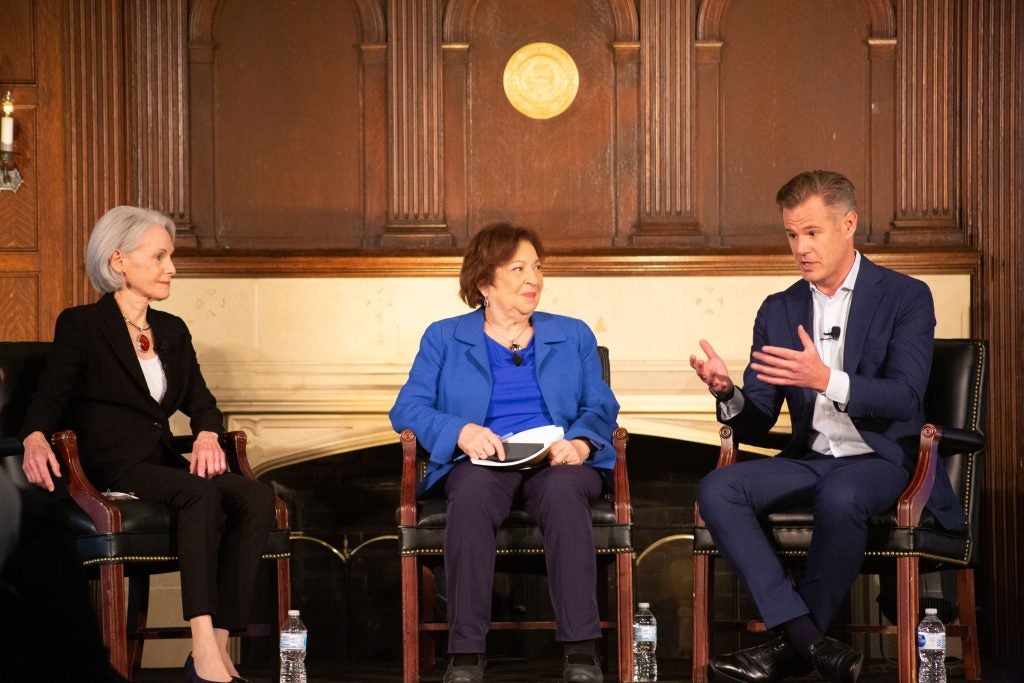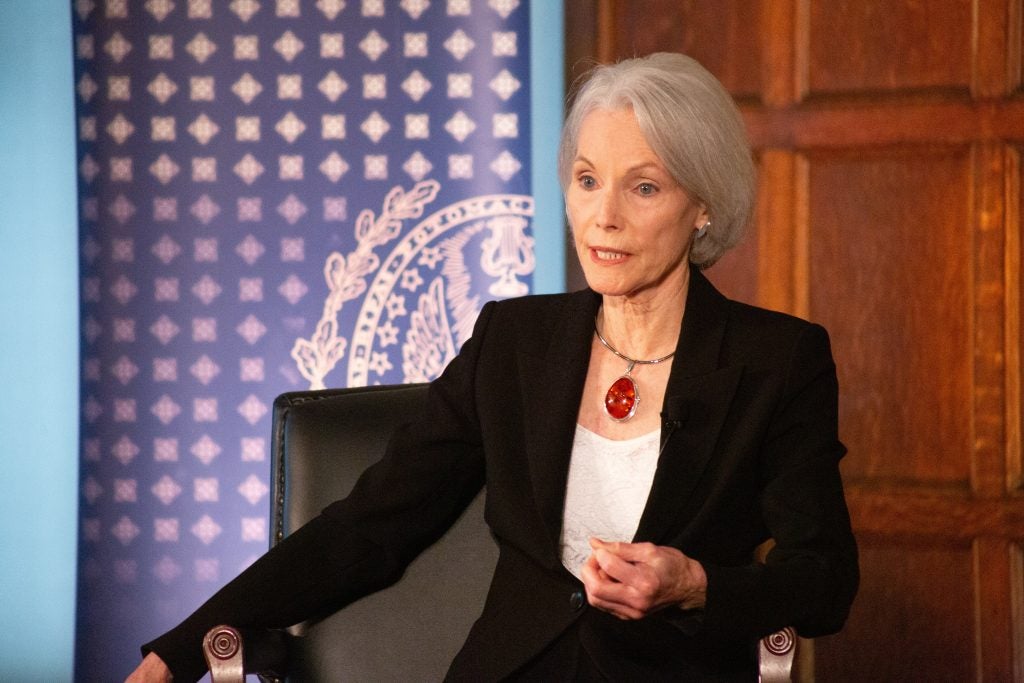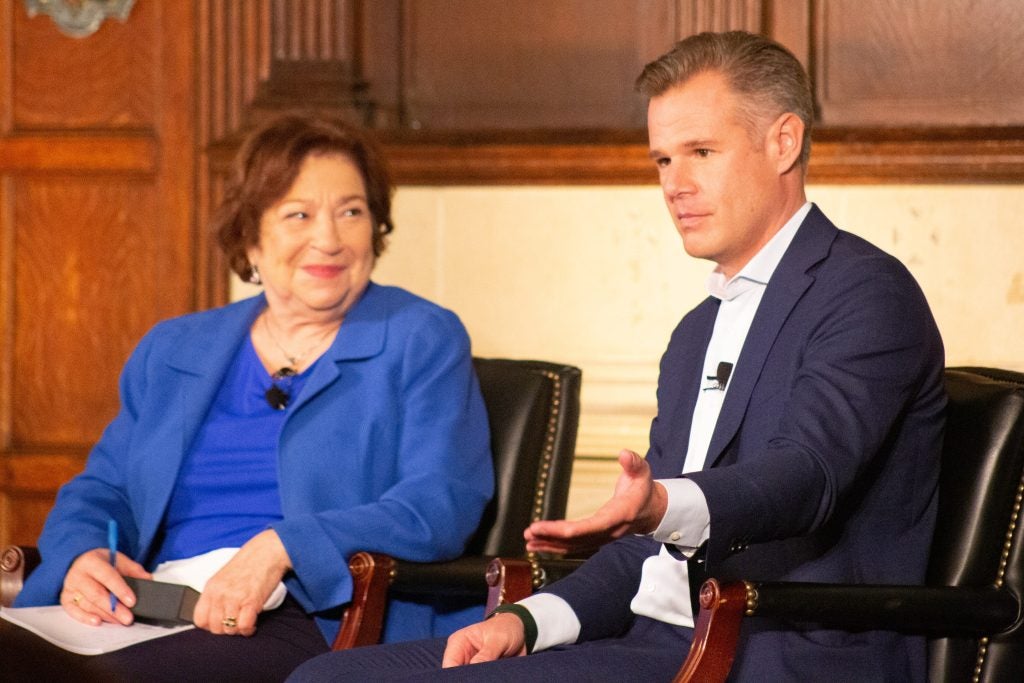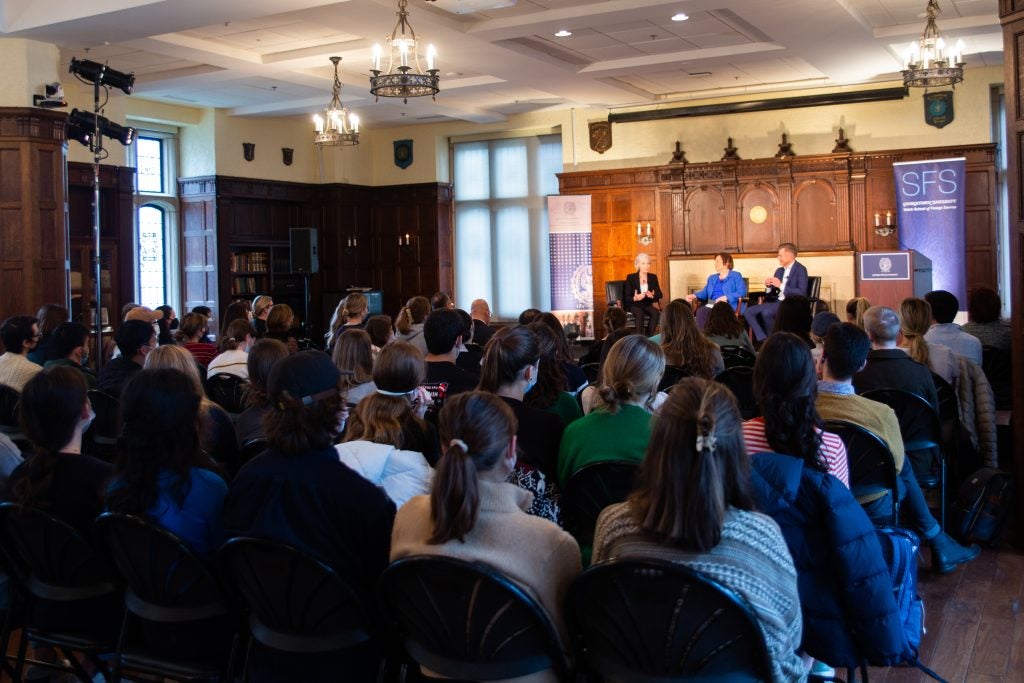On March 24, 2022, CERES, SFS, and the Carnegie Cooperation hosted CERES Adjunct Professor and former CNN Moscow Bureau Chief Jill Dougherty (SCS’13) and CNN Senior National Security Correspondent Alex Marquardt (SFS ’04) for a penal about their work on war between Russia and Ukraine and how it was like to report from frontlines in Russia and Ukraine.
“As we reflect on her legacy, we reflect on the extraordinary challenge to everything she believed in that we see now in Russia’s invasion of Ukraine.” – Dean Hellman
The event started with a moment of silence for Former US Secretary and Georgetown Professor Emerita, Madeleine Albright who passed away the day before (3/23/22). Dean Joel Hellman said, “as we reflect on her legacy, we reflect on the extraordinary challenge to everything she believed in that we see now in Russia’s invasion of Ukraine.” Prof. Michael David-Fox introduced the panelists and noted that Prof. Stent was Prof. Dougherty’s mentor while she studied at Georgetown.
Prof. Stent acknowledged Sec. Albright’s exceptional work and legacy, “She understood very well how important it was to push back against aggressive dictators and to fight for democracy and freedom,” and “her legacy will be with us.”

Then, Prof. Stent opened up the discussion asking Prof. Dougherty and Mr. Marquardt how they got interested in that part of the world.
Prof. Dougherty said that growing up in the 1950s, she is “a creature of the Cold War.” Her high school in Scranton, PA taught Russian, which she and her twin sister took for four years. Their father was an FBI agent, so they thought “you should know your enemy.” She went to the University of Michigan, where she continued her study of Russian and went to Leningrad as an exchange student. In fact, she went to Leningrad State University the same time that Putin was pursuing his law degree there. She said, “We never met, but my life kind of intersected with his, and I’ve followed him ever since.”
Her first job was with Voice of America on short-wave radio, and then she was a broadcaster for 6 years. Afterwards, she joined CNN as a correspondent for many years and remains affiliated, while she now teaches in CERES.
Prof. Dougherty explained how she ended up in Moscow recently. CNN asked her whether she had her visa months prior to the war and made sure she was ready to go. She received a day’s notice to go to Moscow, and she decided to leave after teaching her class on Monday. She also explained to students who might be interested in journalism and wondered about her visa that she did not go on a journalist visa but rather a track 2 visa. After she got to Russia, she had to work overnight. Most producers were Russian, a few British, and most reporters were outsiders.
She watched TV all the time, and the Russian TV was propaganda 24 hours a day. The news was making classic use of propaganda: high emotional tone, angry enemies, fascist regime, Nazis in Kiev, and demonization of the West. She explained that the Russian state really worked on making Russians, many of whom have relatives in Ukraine, to hate Ukrainians and Ukraine. She explained that Putin uses narratives about Ukraine to capitalize on anti-Western sentiment, and in the Kremlin’s rhetoric, Ukraine is “a tool, a cudgel used by the United States to attack Russia and take over.” Prof. Dougherty said that she had not predicted that Putin would actually order an invasion and stressed that she was shocked by this decision.

Prof. Dougherty also said that she watched Putin’s speeches and wanted to get clarity from him to the viewers. What is he suggesting, what does this war suggest? He has said for years, at least 15 years, that the West is out to get Russia. Putin has always said this, but the West did not listen. “You didn’t listen, now listen to me.” Prof. Dougherty also said that his colloquial and facial expressions in the speeches about Ukraine were very similar to what he had had when he started the second war in Chechnya.
“[The war] a tragedy for Russian citizens who do not support the war”
“Just within four weeks, it is 1917 again.” – Prof. Dougherty
Prof. Dougherty shared with the audience that she was staying in a five-star hotel across from the Bureau. In the changing room of the hotel’s swimming pool, she saw women with luxury designer bags, and she wondered if they were expecting a disruption to their way of life with all the sanctions imposed on Russia.. American Express worked the morning she was checking out and stopped working in the afternoon. She had friends fleeing the country, and she could not ask them about their plans because they could be followed and listened to. She said that it is “a tragedy for Russian citizens who do not support the war,” and these people who leave the country might not come back, and the country will lose all these emigrants. “Just within four weeks, it is 1917 again,” remarked Prof. Dougherty.
Prof. Stent echoed Prof. Dougherty’s statement, saying that Russia is going back to the 1950s again, and it is truly a tragedy for Russia.
“That election (2014 Election in Ukraine) was the first step to restoring Ukraine’s dignity.” – Mr. Marquardt quoting Sec. Albright
“It was so relevant to what we’re seeing now, which is Ukrainians fighting for their dignity, for their rights to exist.” – Mr. Marquardt
Mr. Marquardt began his remarks by reflecting on his personal connections with Sec. Albright. He first met Sec. Albright in Ukraine in 2014, when she was observing the elections in Ukraine. He shared that Albright had said to him, “that election was the first step to restoring Ukraine’s dignity.” He continued that “it was so relevant to what we’re seeing now, which is Ukrainians fighting for their dignity, for their rights to exist.”
Mr. Marquardt talked about his career which started with ABC News. He always wanted to be a foreign correspondent, but during the time that he was in Russia, it was when Obama was just elected and Medvedev was in office, and it was the famous reset: “It was a calm and friendly era.” He then moved to the Middle East, Gaza, Syria, and Egypt.
He shared that in May when Yanokovich got kicked out, there were already rumors about Crimea, and they got reports about troops moving into the region. He went to the airport and saw soldiers in camouflage. He asked them what they were coming for, but they did not answer. He remembered covering Crimea, and it was very different from what is happening today. Russians took over bases without firing. It was just shouting, and mostly Ukrainian soldiers shouting, “you are our brothers, why are you here.” There was then the referendum and the vote to join Russia.
Mr. Marquardt talked about moving to the United States five years ago and becoming a national security correspondent. However, he always wanted to keep his foot in the region, and he expressed to his boss strongly, “if Russia invades, I want to be part of this [reporting].”
He communicated that he got to Ukraine early, and he got to see the country and speak with the people before the war broke out. He talked with people in Mariupol, a city that practically nobody had heard of before the war (outside of Ukraine). He recalled that “what stood out was this extraordinary defiance – there wasn’t a single person I met who thought this war was going to start.” He quoted what he had heard from the people, “we have lived with this war for 8 years, and we are used to this. If it happens, we are ready.” Ukraine has a strong military. The West sent weapons, and people are ready to pick rifles. He said that he noticed that patriotism spawned, and there was growing nationalism and patriotism after Crimea and the independence of the Eastern republics. Zelensky became a hero, and he does daily updates on the war. He commented that the US intelligence got so many things right, but also got so many things wrong about what to expect from the Russian military, Ukrainian people and their president.

Mr. Marquardt shared that it was a fulfilling time for a journalist, incredible to see what Ukrainians are doing. But definitely, it is sad to see a country being torn apart by war.
“I came out after about five weeks and obviously we don’t really believe there is any near end in sight,” Mr. Marquardt remarked. “This is truly, as Secretary Albright said, the fight for the dignity of Ukrainians. What Putin plans to do will be a historical mistake.”
Prof. Stent asked Mr. Marquardt whether he met anyone pro-Russia or critical of Zelensky.
“No one is anti-Zelensky.” – Mr. Marquardt
Mr. Marquardt noted the geographical divide. People in Western Ukraine are more pro-European. He discussed his observations about what language people used first. In Donbas, a lot of people are Russian speakers and speak Russian first. He said that in gas stations in Donetsk and Luhansk, people spoke Russian first. He said, “no one is anti-Zelensky,” but ethnic Russians in Donbas would love more autonomy from Kiev. He noted that during the protests in Mariupol ethnic Russians were saying that they did not need to be saved. It contrasted the rhetoric Putin used to justify the war.
Prof. Stent then asked about rumors about top circles in Moscow and opposition in the highest level, as more people from FSB are being arrested.
Prof. Dougherty discussed Putin’s frustrations with the war and his plan of purging Kremlin officials. She said, “I believe this is true,” but also noted, “it’s very hard to report under circumstances like that because you can take propaganda and begin to spread it, and the Kremlin is spreading a lot of propaganda.” She also said from looking at the background and Putin’s clothing, she concluded that Putin’s speeches were pre-recorded.
Mr. Marquardt agreed on that point and added examples of things that show Russia’s unfolding communication strategy. Through analyzing photos and videos, they found that Russia’s recognition of the two republics was determined before the meeting, during which officials discussed this matter. They zoomed in on a watch in the photo of document signing, and it was a day before the meeting. And they found that the video of leaders of the Eastern republics announcing evacuations from Ukrainian attacks were recorded 48 hours before the event.
Prof. Dougherty stressed that now is a different era of journalism that includes metadata analysis and open-source journalism. At CNN, they have people who specialize in metadata analysis of videos and investigate the time, location, and equipment used. Close to Russia’s invasion, internet users were able to use metadata clues from Kremlin videos to counter Putin’s narrative about Russia’s preparation for war.
In light of the NATO summit, Mr. Marquardt discussed Ukraine and NATO, and its negotiation with Russia. He remarked that Zelensky had backed off the stance on Ukraine joining NATO, and neutrality could be an option, and some progress has been made in the negotiations. He said that demilitarization, which was demanded by Russia, is not something that Ukraine could compromise for, and in terms of security guarantees, he questioned, “Which countries are going to guarantee that?”

The panelists took questions from the audience.
SFS sophomore Megan Skinner asked the panelist about the hardest event on which they had reported and how it changed their perspective of being a reporter.
“Bestiality of terrorism and the incompetent cruelty of the Russian government and security forces who actually created more of a problem in a way.” – Prof. Dougherty
Prof. Dougherty shared details about her experience reporting on the Beslan School Siege, in which Islamic terrorists from the Caucasus held more than 1,100 children under hostage for days. Russian forces shot the top of the building which fell down and killed many people. She went through the ruins and saw dead bodies and smelled burned hair. Going back at night and passing by the building, she heard a father screaming in mourning. That event brought home to her the “bestiality of terrorism and the incompetent cruelty of the Russian government and security forces who actually created more of a problem in a way.”
Mr. Marquardt described the difficulty of reporting from Ukraine. He noted that it is important to cover summits and diplomatic meetings, but it is more important to cover personal stories of every episode of conflicts. Examples like that have far-reaching impact and will help people understand what is going on. He said that they meet people on the worst day of their life, and it is difficult to ask them how they feel. He shared a story with the audience: in a Ukrainian village that was hit by an airstrike, he interviewed a man who lost five family members and one family friend. He did not understand the man’s Ukrainian, and he was glad that he did not understand him on the spot because he broke down later when he read the translated transcript of the interview.
Katie Cooper, a member of Georgetown’s women’s club basketball team, asked the panelists for their thoughts on the arrest of American professional basketball player Brittney Griner, who has been detained in Moscow since February.
Prof. Dougherty said, “the timing is pretty obvious, and her being a black woman and gay may have contributed,” noting that the Russian state is hostile toward LGBTQ+ people and people of color.
A student asked whether our panelists encountered hesitancy from people when getting personal narratives, and whether they noticed any reluctance of Russians and East Ukrainians to talk to American journalists.
Mr. Marquardt said that people were generally eager to talk to anyone, but it is wartime, so people may be tired of talking to journalists, and they just want to live their own lives.
Prof. Dougherty shared her experience in Russia that people have opinions and love to share. They talked with people at protests who had particular opinions, anti-government, anti-war, anti-Putin. It is a very dangerous time for them to talk about this. There are one strike, two strikes, three strikes of penalties from the police. One strike- they will let you go, two strikes- you may be detained for a few days, three strikes- you’re going to go to jail. For students, their academic career can be stopped and kicked out of school.
Prof. Stent made concluding remarks, thanking the panelists and everyone for coming and participating in the discussion.